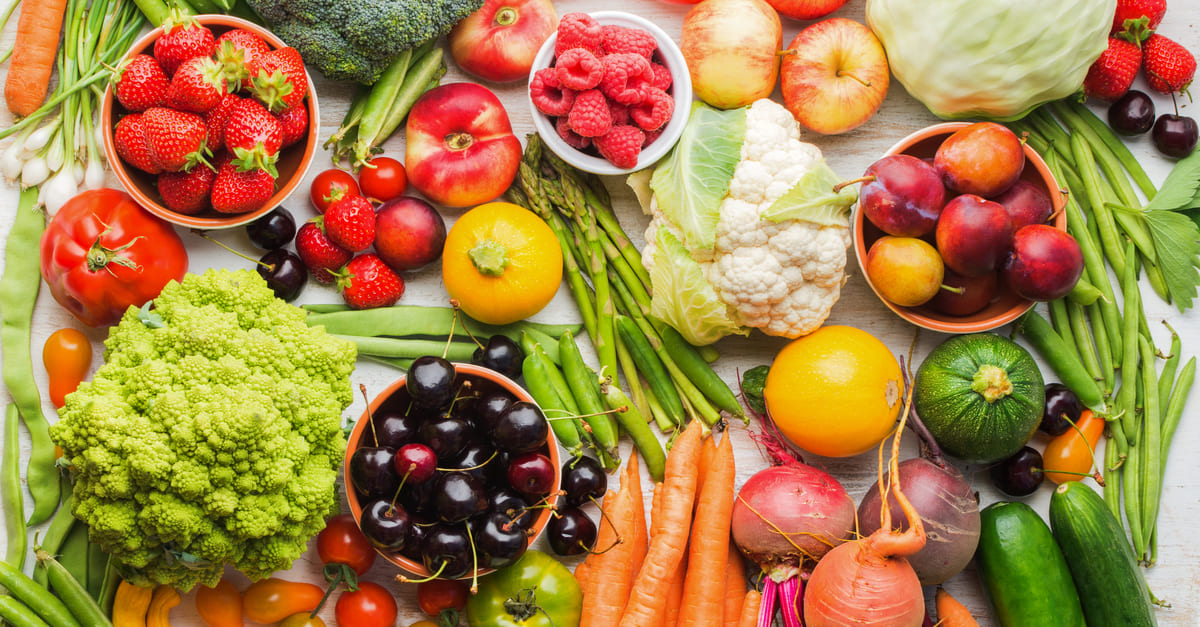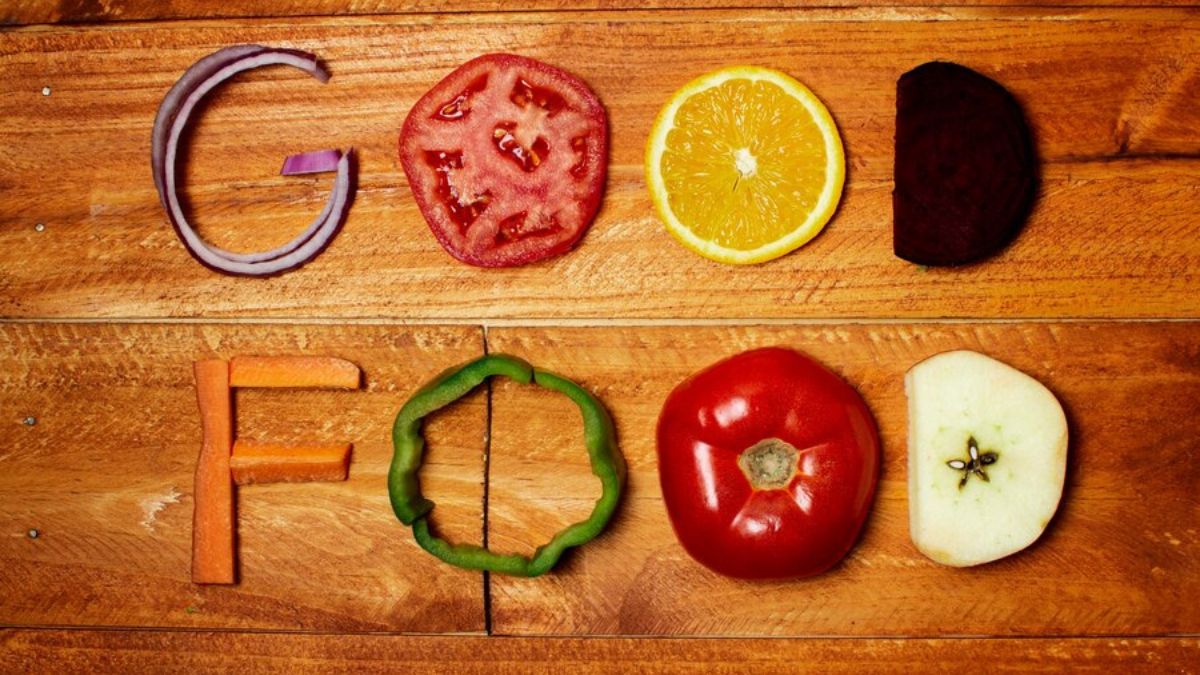FOOD
Exploring the Benefits of Natural Foods for a Healthier Lifestyle

Eating well isn’t just a trend—it’s a necessity. With an overwhelming abundance of processed and fast-food options available, more people are turning to natural foods as a way to reclaim their health, energy, and overall well-being. But why choose natural foods? What are the key benefits, and how can they transform your lifestyle for the better?
This blog dives into the benefits of natural foods, exploring why they’re essential for anyone aiming to live a healthier, more vibrant life. By the end, you’ll have actionable insights to guide your own dietary choices, whether you’re starting fresh or refining your current habits.
What Are Natural Foods?
Before we get started, it’s important to define what we mean by natural foods. Put simply, these are foods that are as close to their natural state as possible. They’re minimally processed, free of artificial ingredients, and often sourced from sustainable farming or production practices.
Examples include:
- Fresh fruits and vegetables
- Whole grains like quinoa, oats, and brown rice
- Nuts and seeds
- Unprocessed meats and dairy products
- Cold-pressed oils such as olive or avocado oil
These foods stand in stark contrast to their processed counterparts, which often contain preservatives, added sugars, and unhealthy fats.
Benefits of Natural Foods
1. Improved Nutritional Value
When you opt for natural foods, you’re choosing nutrient density over empty calories. Fresh vegetables, for instance, are packed with vitamins like C and A, as well as antioxidants that fight daily wear and tear on your body.
Processed foods, on the other hand, are often stripped of their nutrients during manufacturing. That fortified cereal in your pantry? It only contains vitamins because they were added back in—not because they naturally occur. By choosing natural foods, you’re getting essential nutrients straight from the source.
2. Reduced Risk of Chronic Diseases
Natural foods are low in added sugars, sodium, and unhealthy fats, three common culprits behind chronic diseases such as heart disease, diabetes, and obesity. Studies published in journals like The Lancet demonstrate a strong correlation between high consumption of processed foods and poor long-term health outcomes.
For example, swapping sugary snacks for whole fruits can help manage blood sugar levels. Similarly, diets rich in whole grains and legumes have been shown to significantly reduce the risk of cardiovascular issues.
3. Better Gut Health
Your gut is home to trillions of microorganisms that play a key role in digestion, immunity, and even mental health. Natural foods, particularly those rich in fiber like fruits, vegetables, and whole grains, nourish your gut microbiome.
Contrast this with processed foods, which often lead to inflammation and imbalances in your gut. A fiber-rich diet keeps everything moving smoothly while promoting the growth of good bacteria that support overall health.
4. Natural Weight Management
Dieting fads often promise rapid weight loss, but they rarely lead to sustainable results. Incorporating natural foods into your diet is a practical, long-term solution for maintaining a healthy weight.
Why? High-fiber foods and whole grains not only keep you fuller for longer but also stabilize your blood sugar levels, reducing cravings. Pair that with nutrient-dense meals, and you’ll find it easier to manage portion sizes without feeling deprived.
5. More Energy, Fewer Crashes
Processed foods can lead to sharp spikes in blood sugar followed by energy crashes. Ever felt sluggish after indulging in a big, sugary treat? That’s your body overcompensating for the influx of processed sugars.
Natural foods, by contrast, help maintain consistent energy levels throughout the day. Complex carbohydrates from whole grains release energy slowly, while healthy fats from nuts and avocados support sustained vitality.
6. Environmental Benefits
The advantages of natural foods aren’t limited to your body—they extend to the planet too. Organic and sustainably farmed produce often have a smaller carbon footprint than highly processed foods, which require extensive production and packaging.
Additionally, eating natural foods makes it easier to support local markets and small-scale farms working towards eco-friendly agricultural practices.
How to Transition to Natural Foods
Switching to a more natural diet doesn’t have to happen overnight. Here’s a step-by-step approach to making the transition manageable and enjoyable.
Step 1: Start With Small Changes
Begin by adding more whole foods to your meals. Replace your refined white bread with whole-grain options or swap soda for infused water. Gradual changes are more sustainable than a complete overhaul.
Step 2: Read Labels Carefully
The fewer ingredients on the label, the better. Look for foods without added sugars, preservatives, or artificial flavorings. If you can’t pronounce an ingredient, it’s probably not natural.
Step 3: Shop Smart
- Stick to the perimeter of the grocery store, where fresh produce, meats, and dairy products are usually located.
- Visit farmers’ markets for locally sourced fruits and vegetables.
Step 4: Cook at Home
Cooking at home gives you complete control over what goes into your meals. Experiment with simple recipes featuring natural ingredients to discover new favorites.
Step 5: Prep Ahead
Meal prepping can save you time and reduce the temptation to reach for processed snacks. Chop vegetables in advance or portion out grains so you’re always ready to whip up a wholesome meal.
Overcoming Common Barriers
Switching to natural foods can seem daunting for several reasons—cost, time, or unfamiliarity being the most common. Here’s how you can overcome these hurdles.
- Budget: Buy seasonal produce and stock up on whole grains and legumes in bulk. These cost-effective staples are nutritious and versatile.
- Time: Invest in a slow cooker or pressure cooker to prepare meals in advance. Natural doesn’t have to mean time-consuming!
- Picky Eaters: For families, try introducing new foods gradually and in fun, appealing ways, like blending spinach into smoothies.
Natural Foods are More Than a Trend
Choosing natural foods is about more than just eating healthier—it’s about reconnecting with what we eat and supporting a sustainable future. From better nutrition and weight management to environmental benefits, the case for natural foods is clear.
The time to take the first step is now. Start small but be consistent. Your body (and the planet) will thank you for it.
FOOD
Less Calories Than the Leading Brand: A Healthier Choice for Smart Consumers

In today’s health-conscious world, consumers are increasingly looking for ways to reduce their calorie intake without sacrificing taste or satisfaction. One of the most compelling claims a food or beverage brand can make is that its product contains “less calories than the leading brand.” This simple yet powerful statement can influence purchasing decisions, especially among those who are mindful of their weight, fitness goals, or overall well-being.
However, what is the true meaning of this claim? How do companies cut calories without sacrificing flavor? Most importantly, is it always better to go with a lower-calorie option? To help you make wise choices about the meals and beverages you consume, we will take a look at these and other issues in this post.
Why “Less Calories Than the Leading Brand” Matters
1. The Obesity Epidemic and Calorie Awareness
Overconsumption of calories is one of the main causes of the ongoing global increase in obesity prevalence. The World Health Organization (WHO) estimates that 650 million persons are obese and over 1.9 billion are overweight. Weight gain and associated health problems including diabetes, heart disease, and metabolic disorders are caused by high-calorie meals, particularly ones high in sugar and harmful fats.
Customers who wish to control their weight without totally giving up their favorite foods or drinks are drawn to products that claim to have fewer calories than the top brand.
2. The Psychology of Healthier Choices
A product’s claim to be lower in calories appeals to consumers’ desire to make healthier decisions without feeling deprived. Healthy eating is more sustainable when there is a lower-calorie version of a well-known product because many people have trouble sticking to tight diets.
For example:
- A soda with “50% fewer calories than the leading cola” allows consumers to enjoy a sweet drink without as much guilt.
- A snack brand promoting “less calories per serving than the top competitor” attracts health-conscious buyers looking for satisfying yet lighter options.
3. Competition and Innovation in the Food Industry
To satisfy consumer demand for healthier products, food manufacturers are always coming up with new ideas. Brands may provide lower-calorie versions that taste fantastic by reformulating recipes by adding fiber, cutting fats, or utilizing sugar alternatives.
Customers gain from this rivalry since it increases their alternatives and pushes top companies to enhance their own nutritional profiles.
How Do Brands Reduce Calories Without Sacrificing Taste?
Cutting ingredients isn’t enough to make a product lower in calories than the industry leader; careful formulation is needed to preserve flavor and texture. This is how businesses go about it:
1. Sugar Substitutes and Sweeteners
Many high-calorie foods and drinks get their energy content from sugar. To reduce calories, brands may use:
- Artificial sweeteners (aspartame, sucralose, saccharin)
- Natural low-calorie sweeteners (stevia, monk fruit, erythritol)
- Reduced sugar content with added flavors to compensate
Example: Diet sodas often use aspartame or stevia to cut calories while keeping sweetness.
2. Lower-Fat Formulations
Fats are calorie-dense (9 calories per gram vs. 4 for carbs and protein). Brands may:
- Use leaner cuts of meat in processed foods
- Replace butter/oil with applesauce, yogurt, or avocado in baked goods
- Utilize fat-free or low-fat dairy in products like yogurt and cheese
3. Increased Fiber and Water Content
Adding fiber or water can help reduce calorie density while keeping portions satisfying. For example:
- Veggie-based pasta has fewer calories than traditional wheat pasta.
- Broth-based soups are lower in calories than creamy versions.
4. Portion Control and “Light” Versions
Some brands simply offer smaller servings or “light” versions with adjusted ingredients.
Is “Less Calories” Always Better?
While fewer calories can be beneficial for weight management, it’s important to consider nutritional quality. Some low-calorie products may contain:
- Artificial additives (preservatives, colors, flavors)
- High sodium levels (to enhance taste after fat/sugar reduction)
- Lack of essential nutrients (fiber, protein, vitamins)
When to Choose Lower-Calorie Options:
✔ For weight loss or maintenance
✔ When reducing sugar/fat intake is a priority
✔ If the product still provides good nutrition
When to Be Cautious:
✖ If the product replaces calories with artificial ingredients
✖ If it lacks protein/fiber, leaving you hungry soon after eating
✖ If it’s highly processed with little nutritional value
Top Products That Offer “Less Calories Than the Leading Brand”
Here are some common categories where lower-calorie alternatives shine:
1. Beverages
- Diet sodas (Coke Zero vs. regular Coca-Cola)
- Sparkling water (LaCroix vs. sugary sodas)
- Low-calorie juices (Ocean Spray Diet vs. regular cranberry juice)
2. Snacks
- Rice cakes (Quaker vs. higher-calorie crackers)
- Popcorn (SkinnyPop vs. butter-flavored brands)
- Protein bars (Quest Bars vs. traditional candy bars)
3. Condiments & Sauces
- Light mayonnaise (Hellmann’s Light vs. regular)
- Sugar-free ketchup (Heinz No Sugar Added vs. original)
- Low-calorie salad dressings (Bolthouse Farms yogurt dressings)
4. Frozen Meals & Desserts
- Lean Cuisine (vs. higher-calorie frozen dinners)
- Halo Top ice cream (vs. traditional full-fat ice cream)
Making the Best Choice for Your Health
While opting for products with “less calories than the leading brand” can be a smart move, always:
✅ Read the nutrition label – Check for protein, fiber, and micronutrients.
✅ Avoid excessive artificial ingredients – Some sugar substitutes may have side effects.
✅ Balance with whole foods – Fruits, vegetables, lean proteins, and whole grains should still be the foundation of your diet.
Conclusion: A Smart Strategy for Healthier Living
A quick and easy method to cut calories without sacrificing your favorite foods is to choose items with fewer calories than the popular brand. These substitutes can help with weight control and improved eating practices, whether they are low-calorie sodas, light snacks, or healthier frozen meals.
For long-term health, however, always give priority to nutrient-dense, minimally processed meals. You can enjoy delicious food while controlling your calorie intake by combining wise product selections with a healthy diet.
Next time you see “less calories than the leading brand” on a label, you’ll know exactly what it means—and whether it’s the right choice for you!
FOOD
Unlocking Savings: Your Ultimate Guide to the Key Food Weekly Circular

Are you ready to unlock incredible savings at your local grocery store? The Key Food Weekly Circular is your secret weapon for maximizing your budget and getting the most bang for your buck. This handy guide not only highlights the best deals but also opens the door to smart shopping strategies that can lead to substantial savings each week. With a little know-how, you can navigate this treasure trove of discounts and promotions like a pro, ensuring that every trip to Key Food leaves you with a full cart and extra cash in your pocket. Let’s dive into the details of how this circular can transform your shopping experience!
Benefits of Using the Circular
Using the Key Food Weekly Circular opens the door to a world of savings. It provides a curated selection of discounted items that can significantly lower your grocery bill.
Shopping with the circular allows you to plan meals around what’s on sale, making it easier to stick to your budget. You’ll discover new products and seasonal ingredients that might have otherwise gone unnoticed.
Additionally, by keeping up with the latest promotions, you gain insights into special events and sales days at your local Key Food. This knowledge empowers you to make informed purchasing decisions.
The circular often highlights bulk deals too. Purchasing in larger quantities for frequently used items can lead to even greater long-term savings.
Using this resource helps reduce food waste as you’ll be more likely to buy only what you need based on current offers.
Understanding the Layout
Navigating the Key Food Weekly Circular is easier than you might think. The layout is designed for quick reference and maximum efficiency. You’ll find sections clearly divided by product categories, such as dairy, produce, meats, and household items.
Each section prominently displays sale prices alongside regular prices. This visual contrast helps you identify deals at a glance. Look out for the featured items; these are often marked with eye-catching graphics to draw your attention.
Additionally, many circulars highlight bulk purchase opportunities or combo deals in specific areas. This can lead to even more savings if you’re willing to stock up on essentials.
Don’t overlook any special promotions that appear throughout the circular either. These may include limited-time offers or clearance sales that can provide significant discounts on popular products. Understanding this layout will empower you to make savvy shopping decisions easily.
Tips for Saving Money with Key Food Weekly Circular
Maximize your savings by closely examining the Key Food Weekly Circular. Start by noting the featured items, as these often highlight significant discounts.
Create a shopping list based on what’s on sale. This helps you stay focused and avoid impulse purchases that can add up quickly.
Consider planning meals around the week’s promotions. If chicken is on sale, think about incorporating it into several dishes to make the most of your grocery budget.
Don’t forget seasonal produce! Fruits and vegetables in season are usually cheaper and fresher, making them ideal for meal prep.
Check for bonus buys or buy-one-get-one-free deals within the circular, which can lead to substantial savings over time.
Keep an eye out for clearance items that may complement your weekly picks from the circular while providing additional value.
Utilizing Coupons and Promotions
Coupons and promotions can significantly enhance your savings when shopping with the Key Food Weekly Circular. They provide an excellent opportunity to stretch your budget further.
Start by checking both the circular and the store’s website for available digital coupons. These often stack on sale items, maximizing discounts.
Don’t forget about local newspapers or printable coupons that might not be in the circular. Every little bit helps!
Timing is key; plan your shopping trips around big sales or seasonal promotions for even greater savings.
It’s wise to combine manufacturer coupons with store deals whenever possible. This strategy ensures you get the best price on essentials.
Keeping track of expiration dates is crucial as well, so you don’t miss out on those great offers waiting to be redeemed at checkout.
Meal Planning with Key Food Weekly Circular
Meal planning becomes a breeze with the Key Food Weekly Circular. Start by browsing through the latest deals and discounts. You’ll find fresh ingredients and pantry staples at unbeatable prices.
Select a few recipes for the week that incorporate these highlighted items. This not only curbs impulse buying but also optimizes your grocery list based on weekly sales.
Consider leveraging seasonal produce featured in the circular; it’s often fresher and more affordable. Planning meals around these specials can elevate your culinary game while keeping costs low.
Don’t forget to check out any buy-one-get-one offers or bulk pricing available this week. These promotions can help stretch your budget further, allowing you to create delicious meals without overspending.
Using the Key Food Weekly Circular as your guide turns meal prep into an exciting challenge rather than a chore, making grocery shopping feel like an adventure in savings!
Conclusion: Take Advantage of Key Food’s Savings!
Embracing the benefits of the Key Food Weekly Circular can significantly enhance your shopping experience. By understanding how to navigate this valuable resource, you set yourself up for savings that can make a real difference in your budget.
The circular not only highlights weekly deals but also provides insight into seasonal promotions and discounts on essential items. You’ll find everything from fresh produce to grocery staples at competitive prices.
Using coupons in conjunction with these offers will maximize your savings even further. Pairing sales with promotional codes or manufacturer’s coupons gives you an edge when it comes to keeping costs down.
Moreover, meal planning becomes much simpler when utilizing the circular. Planning meals around what’s on sale ensures you’re making cost-effective choices while enjoying delicious food options throughout the week.
By taking full advantage of Key Food’s offerings, you are well on your way to significant household savings and smarter shopping habits. Start exploring today and watch as those savings add up!
FOOD
Discovering the Rich Flavors of Czech Food

Czech cuisine is a hidden gem within Europe’s gastronomic landscape, rooted in a blend of hearty traditions and rich, comforting flavors. For food enthusiasts seeking something beyond the familiar confines of French or Italian dining, Czech food offers a refreshing take on wholesome and satisfying meals.
If you’ve always been curious about Czech food but didn’t know where to start, this guide is for you. We will explore some of the most iconic dishes in Czech cuisine, the ingredients that define them, and why they deserve a spot in your culinary bucket list.
Whether you’re planning a trip to Prague or just looking to recreate authentic Czech flavors at home, prepare your taste buds for a delicious deep-dive into one of Europe’s underrated cuisines.
What is Czech Cuisine?
Czech cuisine reflects the country’s history, geography, and lifestyle. Located at the crossroads of Europe, the Czech Republic has culinary influences from neighboring Germany, Austria, Hungary, and Slovakia—resulting in a cuisine that is both diverse and robust.
At its heart, Czech food focuses on simple yet rich ingredients like meat, root vegetables, grains, and dairy, with a heavy emphasis on soups, stews, and dumplings. While savory dishes dominate, Czech desserts—ranging from pastries to fruit dumplings—offer an equally delightful treat for anyone with a sweet tooth.
But Czech cuisine is more than just a collection of traditional recipes; it’s an experience tied to cultural events, family gatherings, and moments of comfort.
Core Ingredients in Czech Cooking
To fully appreciate Czech cuisine, it’s essential to understand the ingredients that define it.
Here’s an overview of the most common components you’ll find in Czech recipes:
- Meat (pork, beef, chicken, and duck): A centerpiece in most Czech meals, often roasted, stewed, or grilled.
- Potatoes (brambory): Versatility is key—potatoes are boiled, mashed, baked, or turned into dumplings.
- Cabbage (zelí): Often served as sauerkraut, its tangy flavor pairs perfectly with rich meats.
- Caraway Seeds (kmín): A distinctly Czech spice that is used in soups, bread, and hearty main dishes.
- Knedlíky (dumplings): These bread or potato-based dumplings are staples on every Czech dining table.
- Beer (pivo): While technically a beverage, Czech beer often doubles as an ingredient in marinades or sauces—and rightly so, as the Czech Republic has the highest beer consumption per capita in the world.
Iconic Czech Dishes You Must Try
1. Svíčková na smetaně (Marinated Beef Sirloin)
One of the most iconic dishes in Czech cuisine, svíčková is a creamy marinated beef dish served with root vegetables, a thick sour cream sauce, and bread dumplings (houskové knedlíky). The marinade balances savory and slightly sweet flavors, making svíčková a comforting yet elegant choice.
2. Vepřo Knedlo Zelo (Pork, Dumplings, and Sauerkraut)
Considered the national dish of the Czech Republic, this meal brings together tender roast pork, soft bread dumplings, and tangy sauerkraut. Each bite is a harmonious balance of textures and flavors, epitomizing Czech culinary tradition.
3. Guláš (Goulash)
Borrowed and adapted from Hungary, Czech goulash is a hearty beef stew seasoned with paprika and served with dumplings instead of rice. It’s a frequent highlight of Czech pub menus, especially during colder months.
4. Bramboráky (Potato Pancakes)
These fried potato pancakes are flavored with garlic, marjoram, and caraway seeds. They’re served either as a side dish or enjoyed on their own as a snack—often paired with a local beer.
5. Řízek (Schnitzel)
A direct influence from Austria, Czech schnitzel is breaded and fried to crispy perfection. Whether made with pork or chicken, it’s often accompanied by potato salad or boiled potatoes.
6. Koláče (Kolache)
No exploration of Czech food is complete without dessert, and koláče are the stars of Czech pastries. These round pastries are filled with fruit preserves, poppy seeds, or sweetened cream cheese.
Why Czech Food is Gaining Global Attention
Recent years have seen increasing global appreciation for Czech cuisine, driven by its emphasis on local, seasonal ingredients and its nostalgic, comfort-food appeal. Gastronomy tours in the Czech Republic have grown in popularity, with tourists seeking out authentic food experiences from Czech bakeries to beer festivals.
Additionally, the wave of sustainable and slow-food movements aligns effortlessly with traditional Czech cooking methods. Meals made from scratch, using humble yet thoughtful ingredients, resonate with food lovers worldwide.
How to Enjoy Czech Food at Home
If you’re not traveling to the Czech Republic anytime soon, you can still enjoy Czech food from the comfort of your home. Here are some tips to get started:
- Find Traditional Recipes: Look for authentic Czech recipes online or through cookbooks focused on Eastern European cuisines.
- Use Fresh Ingredients: Traditional Czech cuisine relies on fresh and simple ingredients like potatoes, meat, and local vegetables. Prioritizing quality ingredients will elevate your cooking.
- Pair with Czech Beer: Enhance the flavors of your dish with a Czech beer pairing—pilsners like Pilsner Urquell and Budvar are excellent choices.
- Make Dumplings from Scratch: While pre-made dumplings are available, the process of making your own is part of the fun.
Exploring Czech Food Culture
Czech cuisine goes beyond the plate; it captures the spirit of its people. Sharing a meal in a Czech home or a rustic pub surrounded by friendly faces creates a sense of belonging and community.
Similarly, Czech holidays like Christmas and Easter come with their unique traditional foods—such as vánočka (braided sweet bread) during the festive season or mazance (Easter sweet bread). These culinary traditions strengthen bonds and make Czech food a joy to explore all year round.
Your Next Culinary Adventure Starts Here
Whether you’re tasting svíčková for the first time or mastering the art of making dumplings, Czech food offers endless opportunities for exploration. Its rich flavors, heartwarming combinations, and cultural significance make it a cuisine you’ll want to return to again and again.
If you’re ready to bring a touch of Czech tradition to your table, start experimenting with some of the classic recipes highlighted in this guide—and don’t forget to pair them with a refreshing Czech beer to complete the experience.
-

 NEWS2 months ago
NEWS2 months agoWhat is www.avstarnews.com and What Does It Offer?
-

 TECHNOLOGY7 months ago
TECHNOLOGY7 months agoGomyfinance Invest: Simplify Your Path to Financial Growth
-

 TECHNOLOGY2 months ago
TECHNOLOGY2 months agoAtfboru: A Creative Platform for Designers, Artists, and Entrepreneurs
-

 BUSINESS2 months ago
BUSINESS2 months ago.Ydesi: Exploring Its Significance and Applications
-

 CRYPTO5 months ago
CRYPTO5 months agoCrypto30x.com Gemini: Revolutionize Your Crypto Trading Experience
-

 NEWS1 year ago
NEWS1 year agoDogo News: The Latest Trends in the World of Dogo Argentino
-

 EDUCATION1 year ago
EDUCATION1 year agothe christian between the gospel and society
-

 ENTERTAINMENT1 year ago
ENTERTAINMENT1 year agoWWE SmackDown Episode 1491: Unforgettable Moments That Left Fans Roaring
